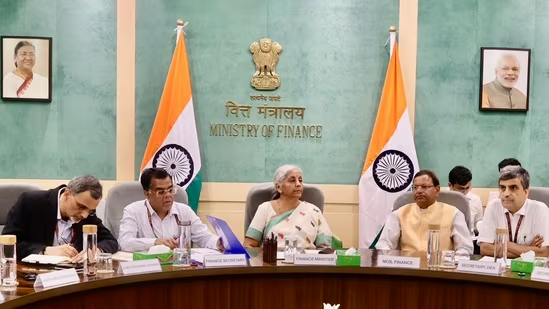 Image Source: Hindustan Times
Image Source: Hindustan Times
The Indian government has officially announced that pre-budget meetings for the Union Budget for FY2026–27 will commence on October 9, 2025. The Ministry of Finance, through its Department of Economic Affairs, will lead the six-month-long preparation process, culminating in the presentation of the budget by Finance Minister Nirmala Sitharaman on February 1, 2026. This will be the third budget under the Modi 3.0 administration and the ninth consecutive budget presented by Sitharaman, a record in Indian parliamentary history.
The FY27 budget is expected to be a pivotal document, balancing fiscal discipline with growth imperatives, especially as India navigates global trade disruptions, domestic inflationary pressures, and ambitious infrastructure targets.
Key Highlights of the Budget Preparation Timeline
-
Pre-budget meetings will begin October 9, 2025, chaired by the Secretary (Expenditure)
-
Ministries and departments must submit budget estimates and data into the Union Budget Information System (UBIS) by October 7
-
Consultations will continue through mid-November, followed by internal reviews and fiscal modeling
The final budget will be tabled in Parliament on February 1, 2026
Strategic Focus Areas for FY27 Budget
Fiscal Consolidation
-
The government aims to reduce the fiscal deficit to below 4.4 percent of GDP, down from 5.1 percent in FY26
-
Rationalization of subsidies and improved tax buoyancy are expected to be key levers
Capital Expenditure
-
Capex is likely to remain a cornerstone, with expectations of a ₹12 lakh crore allocation, up from ₹11.21 lakh crore in FY26
-
Priority sectors include railways, roads, renewable energy, and digital infrastructure
Social Sector Spending
-
Enhanced allocations are anticipated for healthcare, education, and nutrition missions
-
Schemes like PM-JANMAN and Saksham Anganwadi are expected to receive increased funding
Tax Reforms
-
The budget may introduce a simplified direct tax code and further rationalize GST slabs
-
Relief for middle-income taxpayers and MSMEs is under consideration to boost consumption
Green Growth and Climate Finance
-
The budget will likely expand support for green hydrogen, solar manufacturing, and EV infrastructure
-
A dedicated climate finance framework may be introduced to attract global capital
Stakeholder Consultations and Industry Engagement
-
The Finance Ministry will hold sectoral consultations with industry bodies including CII, FICCI, ASSOCHAM, and NASSCOM
-
Farmer organizations, MSME representatives, and civil society groups will also be invited to share inputs
-
The ministry is expected to conduct thematic sessions on employment generation, export competitiveness, and digital transformation
Political and Economic Context
-
The FY27 budget will be framed against the backdrop of global economic uncertainty, including trade tensions and commodity price volatility
-
Domestically, the government faces the challenge of sustaining 7 percent GDP growth while managing inflation and job creation
-
With general elections scheduled for mid-2029, this budget could set the tone for long-term policy continuity and voter engagement
Technology and Transparency Measures
-
The government will continue using the Union Budget Information System (UBIS) for real-time data integration and cross-ministry coordination
-
Budget documents will be made available in digital formats, with interactive dashboards for public access
-
AI-based tools may be deployed to analyze spending efficiency and policy impact
Conclusion
The launch of pre-budget meetings for FY27 signals the beginning of a critical fiscal exercise that will shape India’s economic trajectory over the next year. With a focus on growth, inclusion, and sustainability, the government is expected to craft a budget that balances ambition with pragmatism. As consultations begin, stakeholders across sectors will be watching closely for signals on policy direction, investment priorities, and reform momentum.
Sources: Economic Times, Business Today, ET Now, Rediff Money.
Advertisement
Advertisement






